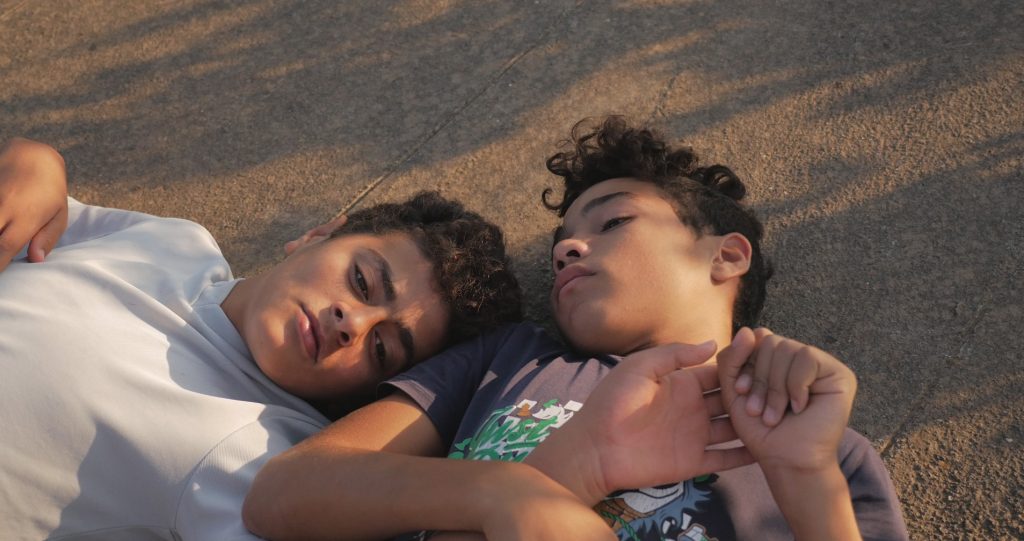Città Giardino





In the middle of the burning heat in Sicily an abandoned, unadorned house. Six unaccompanied, underage refugees wait here for the mills of the Italian administration to continue their “case”. Monotony and isolation, the smartphone as the only window to the outside world, dominate everyday life. But the young people do not surrender inactively to the supposed hopelessness.
Città giardino revives memories of the filmmakers Marco Piccarreda and Gaia Formenti of their time in the “Pope Francesco” lodging in Priolo Gargallo (Syracuse). It is one of the Italian government’s so-called Help Centres, where refugee unaccompanied minors have to spend a month after their arrival in Italy before more suitable accommodation is organised for them. Since 2014, the two filmmakers have been visiting the young people there, interviewing them, accompanying them in their daily lives, but also those of the staff – often representatives of NGOs – who are trying to give the children access to education, medical care and a little variety. In many cases, not only a difficult task in terms of personnel, but also in terms of infrastructure: the homes, unloving and quickly erected prefabricated houses, are usually located somewhere in deserted areas.
Città giardino was filmed by filmmaker Marco Piccarreda and screenwriter Gaia Formenti in one of these now abandoned transitional dwellings, in the very place they had previously visited. The six young people in the film, aged between 14 and 18, have experienced everyday life in the homes themselves and revive their experiences of that time in the imaginary “Città giardino” in an autofictional way. The rigidity of everyday life, which consists of forced inactivity, structured solely by the always same sequence of eating, sleeping, eating, sleeping. In between, the smartphone as the only window to the moving world outside and as a bridge to one’s own past. The camera captures this atmosphere of all-encompassing inactivity more than masterfully and in a symbolically rich way: a broken children’s car that can only be moved with difficulty, the pre-cooked noodles preserved in the Tupperware as a metaphor for life kept under lock and key. In addition, a clever game on a paratextual level: the title in fairytale-like medieval letters as a reference to the apparent timelessness and placelessness of an anti-fairytale, whose protagonists are then not locked up in a flourishing Garden of Eden, but in a “Giardino” that is dust-dry under the heat, just like the double-framed “G” in the title.
But stories allow outbreaks, and so two of the residents hatch an escape plan.
Statement
“More and more frequently African boys, little more than children, choose to undertake the arduous journey that leads them into Europe along routes considered illegal. […] Once in Italy they are separated from adults and collected in CPAs, centres where they should remain for 30 days before being routed to the most appropriate structures. As a matter of fact, the lack of means and the slowness of Italian bureaucracy transform this temporary stay in an agony of hallucinated inactivity. CPA guests always sleep, eat pre-packaged meals and use their time to peer into their cell phones. Many of them escape, others fall into a state of clinical depression. After having passed years to gather testimonies, we have realized how the time spent in the CPAs dug a vacuum deep inside these children. How can the mind of a teenager, who survived the war and poverty, react when he find [sic!] himself stuck for months in a remote corner of a foreign island? What’s left of his thrust [sic!] toward the future? Of his reckless courage? Of his own identity?”
Marco Piccarreda
*1976; 1998 graduated from the Milan Film School, then worked for various production companies as a filmmaker; 2003 assistant director and aisstant editor in the film Tu devi essere il lupo – nominated for the David di Donatello Film Prize as best debut film; 2005 founded the production company 50Notturno Ltd. with Vittorio Moroni. Films: Se chiudo gli occhi non sono piu’ qui (2013), Eva e Adamo (2009), Le ferie de Licu (2006)
Gaia Formenti
*1985; writer and screenwriter; author of two novels and of the poetry collection Poesie Criminali, awarded the Antonio Fogazzaro Poem Award; 2017 winner of the Short Tale National Contest “8×8” of the Turin Book Fair; currently lecturer in screenwriting at ther Civica Scuola di Cinema Luchino Visconti in Milan and at the Istituto Cinematografico Michelangelo Antonioni; also creative tutor for Milano Film Network.
Credits
WRITTEN AND REALISED BY Marco Piccarreda and Gaia Formenti
DIRECTED BY Marco Piccarreda
PRODUCED BY Marco Piccarreda and Gaia Formenti in collaboration with EliantoFilm


